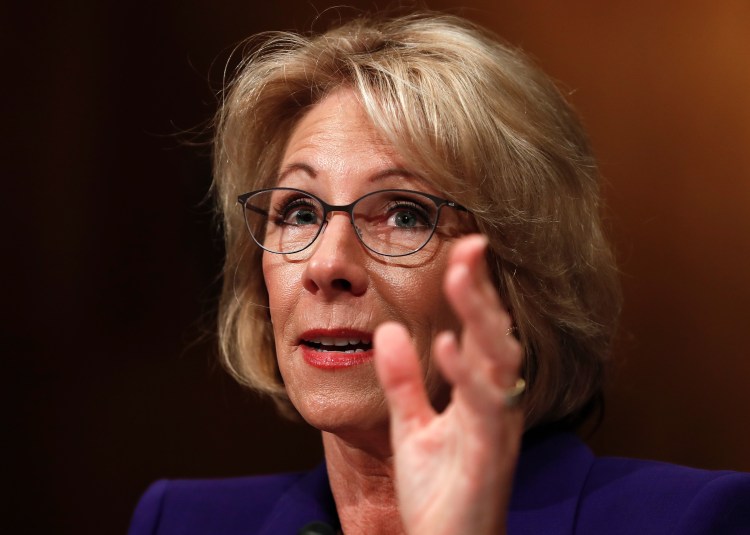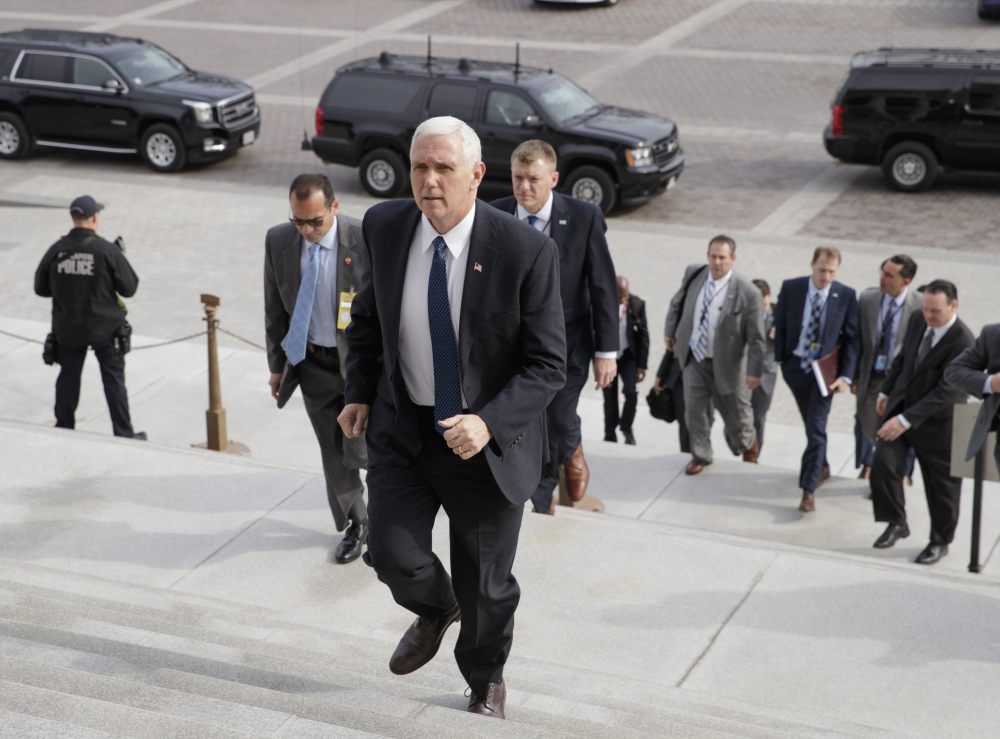The Senate narrowly confirmed Betsy DeVos as education secretary Tuesday, with Vice President Pence casting a historic tie-breaking vote after senators deadlocked over her fitness for the job.
The entire Democratic caucus of 48 senators voted against DeVos, including independent Angus King of Maine, as did two Republicans, Susan Collins of Maine and Lisa Murkowski of Alaska, who said they do not think DeVos is qualified for the job. The remaining 50 Republicans voted for DeVos, setting up a 50-50 tie that Pence broke with his vote around 12:30 p.m.
It marked the first time that a vice president’s tie-breaking vote was needed to confirm a Cabinet secretary, said Daniel Holt, an assistant historian in the Senate Historical Office.
And it was the first time that a vice president had cast any tie-breaking vote in the Senate since Richard B. Cheney did so nine years ago.
The confirmation vote came after dozens of Democrats took to the Senate floor to speak out against DeVos for most of the day Monday and through the night into Tuesday, a 24-hour last-ditch effort to persuade one more Republican to break party ranks and derail the confirmation. They argued that she doesn’t understand or believe in public schools and that she is not committed to enforcing civil rights laws related to education, and should therefore be disqualified from leading the Education Department.
But as the hours wore on, it became increasingly clear that their effort would fail.
SUPPORT, WAVE OF OPPOSITION
“I hope against hope that another Republican senator will have the courage of the senators from Alaska and Maine and join us,” Minority Leader Chuck Schumer, D-N.Y., said Tuesday morning. But if that doesn’t happen, Schumer said, “we Democrats are very proud of what we have done, because the nominee is so unqualified – and now Americans now know that.”
The Democratic speeches were interrupted occasionally by Republicans coming to the nominee’s defense. Sen. Tim Scott, R-South Carolina, said DeVos – who has no professional experience in public education – would bring “fresh eyes” to the job and pursue more opportunities for poor and disadvantaged children.
“We need to make sure that every child in every ZIP code has a quality choice,” Scott said Tuesday, moments before the scheduled vote.
President Trump also weighed in via Twitter: “Senate Dems protest to keep the failed status quo. Betsy DeVos is a reformer, and she is going to be a great Education Sec. for our kids!” he wrote.
DeVos has faced an unprecedented wave of popular backlash and partisan opposition: Since the Education Department was established in 1979, nominees to lead it have always been easily confirmed, often on voice votes or with unanimous support. The closest confirmation vote for an education secretary was 49 to 40 in 2016, in favor of John B. King Jr., who served during the last year of Barack Obama’s presidency.
But DeVos, 59, is unlike previous nominees in that she has no personal or professional experience in public education or elected office.
A Michigan billionaire and major Republican donor, she has spent three decades using her wealth and political clout to advocate for alternatives to public schools, particularly taxpayer-funded vouchers to help parents pay tuition for private and religious schools. She also has advocated for a loosely regulated variety of charter schools.
Republicans have defended her as an outsider who would challenge the status quo, and as a conservative who would reduce the federal footprint in public schools. They are keen to change course after eight years in which the Obama Education Department exercised an unusually high level of influence.
“Betsy DeVos has committed: No more Washington mandates, no more national school board,” Sen. Lamar Alexander, R-Tennessee, chairman of the Committee on Health, Education, Labor and Pensions, said shortly before noon Tuesday. “I urge a yes vote.”
But DeVos’ free-market approach triggered opposition from teachers unions, which mobilized considerable forces against her, as well as from fellow education reformers who said they worried she was more committed to the ideology of “school choice” than to ensuring quality schools for vulnerable children.
“Is this a knowledgeable candidate who understands the federal law? Is this a candidate who comes to us without conflicts of interest? Is this a candidate who is willing to stand up and be the defender of all young children in the schools?” Sen. Patty Murray of Washington, the committee’s ranking Democrat, said Tuesday. “To me, and I think to many of my colleagues who have been out here speaking, she is not.”
SPECULATING ON WHAT’S NEXT
DeVos was not widely known when Trump picked her in November. But that changed after her performance at a confirmation hearing in January, when she stumbled over basic policy questions and left open the possibility that she would cut education funding, privatize public schools and scale back the Education Department’s civil rights work.
Sen. Tom Udall, D-New Mexico, said DeVos displayed a “profound lack of understanding about education policy” at her confirmation hearing. “I can’t say it enough: A vote for Ms. DeVos is a vote to destroy our public school system,” he said Tuesday.
Video clips from that hearing went viral, and DeVos became an instant meme just days before Trump’s inauguration. Opposition to her nomination then rode a wave of anti-Trump momentum after the Women’s March on Washington.
It remains to be seen whether the push-back against DeVos across the country and on Capitol Hill would affect her ability to advance her agenda in office. She has promised that she would not force vouchers onto states that don’t want them, but she also has said that she continues to think that it’s important for parents to have the opportunity to choose alternatives to traditional public schools – including vouchers, full-time virtual schools and public charter schools.
Trump has pledged to redirect $20 billion in federal funds to an effort to expand school voucher programs and charter schools. This proposal, which would require congressional approval, seemed a heavy lift even before the resistance to DeVos’ nomination.
There also has been speculation that the Trump administration may seek to promote private-school choice in a broad overhaul of the tax code, or through a competitive grant program such as Obama’s Race to the Top, which helped persuade states to adopt Common Core academic standards and new teacher evaluations in return for a better shot at federal dollars.
Some Republicans hope that, with Trump and DeVos in office, they would be able to win a fight they have lost repeatedly in recent years: allowing $15 billion in Title I funds, meant for the education of low-income children, to follow students to the schools of their choice, including private schools.
EDUCATION OUTSIDER WITH POWER
There are plenty of priorities that DeVos could push with executive power, including rolling back or revising Obama administration guidance on how schools handle complaints of campus sexual assault and what accommodations they must make for transgender students. The agency also has wide latitude to decide how aggressively to investigate complaints about civil rights and special-education services, and it is responsible for deciding whether state plans for judging the success of schools measure up to the law.
Democrats argue that the uprising against DeVos would hamper her ability to lead. Murray said Monday that DeVos would be “the most controversial and embattled” secretary in the history of the department.”
“She would start this job with no credibility inside the agency she is supposed to lead. With no influence in Congress. As the punchline in late-night comedy shows – and without the confidence of the American people,” said Murray, who anchored the Democrats’ 24-hour speech-a-thon.
But Sen. John Cornyn, R-Texas, praised Trump for choosing a nominee who is not “another education bureaucrat.” Instead, he chose “someone more interested in results than paying homage to and feeding the education establishment here in Washington.”
Copy the Story LinkSend questions/comments to the editors.





Success. Please wait for the page to reload. If the page does not reload within 5 seconds, please refresh the page.
Enter your email and password to access comments.
Hi, to comment on stories you must . This profile is in addition to your subscription and website login.
Already have a commenting profile? .
Invalid username/password.
Please check your email to confirm and complete your registration.
Only subscribers are eligible to post comments. Please subscribe or login first for digital access. Here’s why.
Use the form below to reset your password. When you've submitted your account email, we will send an email with a reset code.